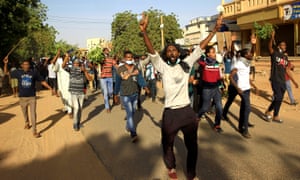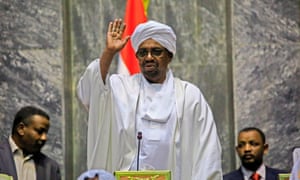{UAH} Dozens have been killed by the regime. But Sudan’s protesters march on
Dozens have been killed by the regime. But Sudan's protesters march on
What began as a response to rising food prices has become a full-blown revolt against Omar al-Bashir's rule
Marching at night, the demonstrators raised their hands in the air. "Peaceful, peaceful," they chanted. Their slogan has become a familiar refrain in Sudan over the past 10 days as the vast north-east African nation that for 25 years has been ruled by the same man, President Omar al-Bashir, is rocked by protests.
What started this month as a demonstration against the tripling of the price of bread in the eastern city of Atbara has spread across the country as thousands of people take to the streets to vent their anger – and not just over food prices. Protests have taken place in the capital, Khartoum, and Atbara, Port Sudan and Madani over the past week, with those involved vowing not to stop until the country's rulers are overturned.
"I don't think the authorities will [be able to] control the huge number of disgruntled demonstrators," said one protest leader. "We are committed to peace."
Bashir's security forces have responded by cracking down severely and continually. Thirty-seven people were killed in the protest's first five days, according to Amnesty International. Observers say the number has since risen to more than 60. On Friday worshippers in Omdurman, the country's second-largest city, were teargassed by police after weekly prayers. Even so, they marched. Across the country, as nine opposition leaders were arrested, thousands of people turned out.
It is far from the first time that there has been an outcry against the rule of Bashir, whose presidency has been marked by multiple civil wars and brutal repression. But these protests started and spread in a different way from previous ones, which have often begun in the capital and focused on Khartoum-specific issues.
This unrest started on 19 December in the city of Atbara in River Nile state. Demonstrators set fire to the headquarters of the ruling National Congress party, burning it to the ground. Many of the protesters involved have been women, teenagers and students.
Amjed Farid, a leading civil society member who spent the first four months of 2018 in detention, said two-thirds of the country's budget went on "security and sovereignty", compared with less than 5% on health, education and social services combined. "The economic crisis itself is of a political nature. It's been caused by the mismanagement and corruption of those at the top of the regime," he said. His point was echoed by those spending their days on the street.
"Our demands started with improving the situation – we've been facing a problem of shortages in cash flow, bread and oil for a while," said a protest leader. "But when they started killing, our demands converted to toppling the regime."
Sudan has a record of effecting change through revolution, and some of those involved in the protests reject comparisons with the Middle Eastern and North African unrest known at the time as the Arab Spring.
President Omar al-Bashir delivers a speech to members of his ruling party. Photograph: Ashraf Shazly/AFP/Getty Images"This is not part of the Arab Spring. Our people in Sudan have history," said Farid, pointing to the October Revolution of 1964 and the April Intifada of 1985, which respectively overthrew Sudan's first and second military dictators. "I hope the past repeats itself," he added.
Bashir is wanted by the international criminal court for genocide, extermination, murder, rape, torture and a host of other charges for crimes allegedly committed in Darfur, but has so far avoided arrest.
On Friday he had to be bundled out of a wedding he was attending as protesters started shouting "Leave, Bashir" outside the mosque. His security forces have employed various tactics to try to quell the unrest. Journalists have been attacked and arrested and their publications closed in attempts to stop news of the protests getting out. The internet has been disrupted, but many are getting round blocks with the help of virtual private networks.
Marching near Alwaha mall in Khartoum on Christmas Day, the protest leader said he had seen four men beating a woman demonstrator of about 20 years old with sticks and shoes. They bundled her into a vehicle and took her away, he said; he did not see her again. Dozens of people were arrested that day. Many were beaten and later released.
One of those who was not was Abdelrahman Alsadig, a student at the University of Khartoum. According to posts shared among protesters, the police told his family they had found him drowned in the Nile, but his father said he had identified signs of torture on his body.
Internationally, Bashir has recently become less isolated. European governments see Sudan as an important partner in stopping migration to their shores; last year the US lifted sanctions, including a trade embargo that Bashir had blamed for many of Sudan's woes.
Complete capitulation by Bashir's NCP is unlikely. Another possibility is a coup. But though Bashir is weak, so are the people who want to replace him, of whom there is a complex web.
More protests are planned for coming weeks, and protesters say they will continue as long as Bashir is in power. "He cannot rule 40 million people who all hate him," said Farid.
Disclaimer:Everyone posting to this Forum bears the sole responsibility for any legal consequences of his or her postings, and hence statements and facts must be presented responsibly. Your continued membership signifies that you agree to this disclaimer and pledge to abide by our Rules and Guidelines.To unsubscribe from this group, send email to: ugandans-at-heart+unsubscribe@googlegroups.com








0 comments:
Post a Comment